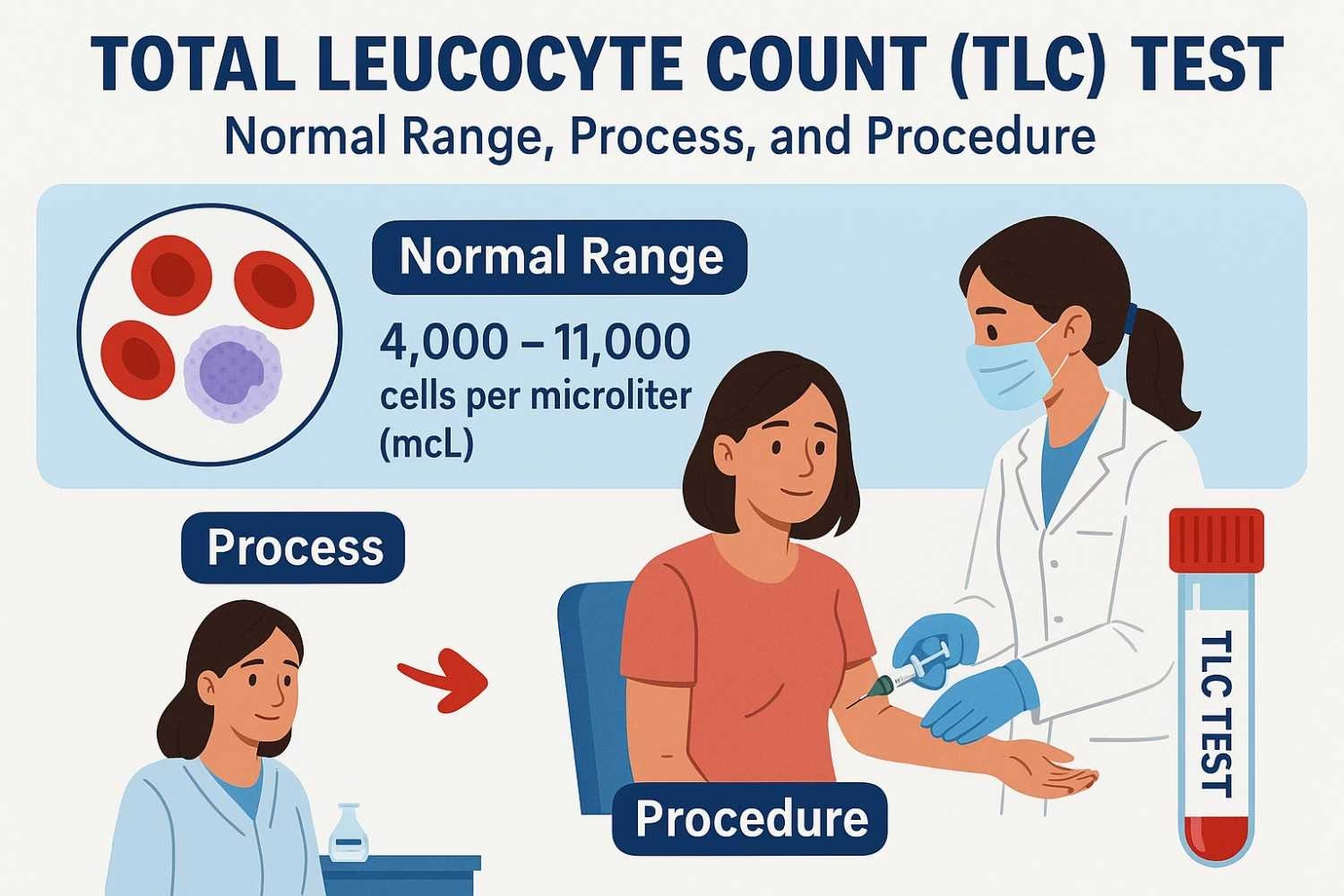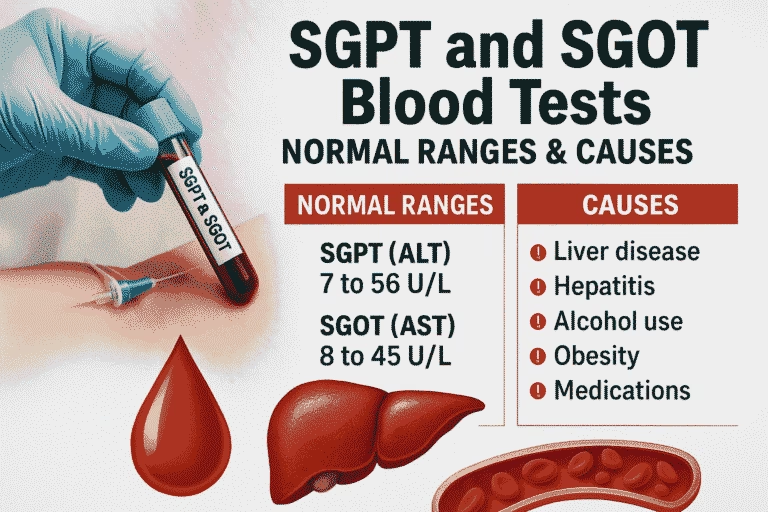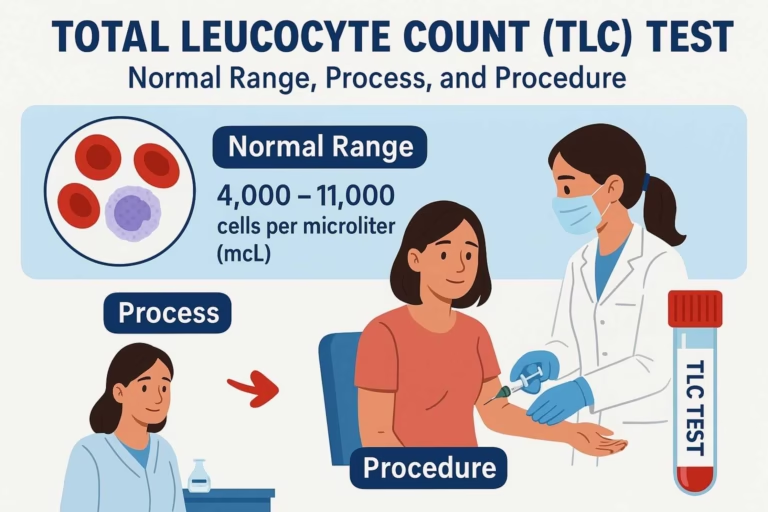
What is TLC test?
The Total Leukocyte Count (TLC) test measures the number of leukocytes (white blood cells) in your blood. It helps determine the levels of the five main types of white blood cells. These are:
- Neutrophils: Respond to inflammation and combat bacterial infections. High levels could indicate bacterial infections or stress.
- Lymphocytes: Immune cells that protect against viruses and chronic infections. Low levels could indicate immune deficiencies.
- Monocytes: Eliminate damaged or dead cells and combat infections. High levels may indicate chronic inflammation or specific infections.
- Eosinophils: They protect against parasites and contribute to allergic reactions. A high count may indicate allergies or parasitic infection.
- Basophils: During inflammation and allergic reactions, they release histamine. Elevated levels could be a sign of specific blood disorders or ongoing inflammation.
A rise in any of these might be a sign of an infection, inflammation, or other underlying illness that needs more care.
What are the conditions associated with an abnormal leukocyte count
A TLC test is frequently used to determine white blood cell levels or as part of a Complete Blood Count (CBC). You may require this test if you have conditions like:
- Blood disorders – Conditions affecting clotting or bleeding.
- Autoimmune diseases – Such as rheumatoid arthritis or lupus.
- Inflammation and infections – Indicated by abnormal WBC counts.
- Bone marrow dysfunction – Affecting immune response and blood cell production.
- Immune deficiencies – Low WBC levels cause a weakened immune system.
Why is a leukocyte count test suggested?
- Routine Health Check-up: Used as part of a comprehensive health assessment to detect early signs of disease and evaluate overall health.
- Infection detection: Aids in determining the source of symptoms such as fatigue, body pain, or fever.
- Monitoring Health Conditions: Helps to track infection recovery or the effects of medication.
- Immune System Evaluation: Assesses the body’s ability to fight foreign invaders and infections.
- Blood Disorder Diagnosis: Detects abnormalities such as anemia and leukemia.
- Post-Surgery or Transplant Monitoring: Helps monitor immune system recovery after major medical procedures.
Preparation for the TLC Test
The TLC test usually does not require special preparation. However, you should:
- Inform your doctor about any ongoing medications.
- Follow dietary or lifestyle advice if recommended.
- Stay calm and relaxed before the test to ensure accurate results.
Procedure for TLC test
The steps for the TLC test are simple and quick:
- A healthcare professional ties a band around your arm and cleans the area with a disinfectant.
- A sterilized needle is inserted into a vein to draw a small blood sample.
- The blood is collected in a vial and sent for laboratory analysis.
- Afterward, a bandage is applied to the puncture site.
What is the normal Range of leukocyte count?
The normal TLC range is between 4,000 and 11,000/microliters of blood.
This may vary slightly based on age, sex, and overall health:
- Men: 5,000–10,000/microliters
- Women: 4,500–11,000/microliters
- Children: 5,000–10,000/microliters
What are the possible Risks Associated with Abnormal TLC Levels
| TLC Result | Normal Range (Varies by lab) | Possible Causes/Risks |
| High TLC | Generally 11,000/μL or above (Leukocytosis) | Infections (Fever is often a symptom of infection), Inflammatory diseases, Injury/Tissue damage, Stress, Allergies and Asthma, Pregnancy, Hemorrhage, Heart attack (Myocardial necrosis), Malignancies (Leukemia, Bone marrow tumors), and Leukemoid reaction (an extreme, non-leukemic elevation). |
| Low TLC | Generally 4,000/μL or below (Leukopenia) | Severe/Overwhelming Infections (including HIV/AIDS and Malaria), Autoimmune disorders (Lupus), Bone marrow disorders, Cancer therapy/Medication side effects (e.g., chemotherapy), Splenic disorders, Liver dysfunction, Alcoholism, and Lymphoma. |
What are the lifestyle Tips for a healthy WBC count?
Maintaining a healthy WBC count improves overall immunity.
- Balanced Diet: To support WBC production and immune function, consume protein-rich foods such as lean meats, eggs, and legumes, as well as vitamins (B12, folate) and minerals.
- Regular Exercise: Moderate activities like walking, cycling, and yoga improve circulation, allowing WBCs to move more efficiently and fight infection.
- Adequate Sleep: Good sleep promotes immune health by allowing WBCs and immune proteins to function normally. Poor sleep can impair the immune system.
- Stress Management: Stress can reduce WBC activity. Simple practices like meditation, deep breathing, and light yoga can help you maintain a healthy immune system.
- Avoid Smoking and Excessive Alcohol: Smoking and drinking heavily can impair WBC function and reduce the body’s ability to fight infections, so limit or avoid them.
What is the cost of the TLC test in India?
TLC tests in India typically cost between ₹200 and ₹900, depending on the diagnostic center, location, and test package chosen. Some labs also provide home sample collection services for convenience.
Conclusion
The TLC test is important for diagnosing and monitoring a variety of blood and immune system disorders. It helps detect infections, autoimmune diseases, and other underlying conditions that affect your health. If your TLC count is abnormal, you should not self-diagnose. Always consult your doctor for additional evaluation and testing to ensure an accurate diagnosis and timely treatment.
FAQs
- What is the TLC test?
The Total Leukocyte Count (TLC) test counts the number of white blood cells in your blood to determine immune function and identify infections or disorders. - What is the normal TLC range?
Adults typically have a TLC range of 4,000 to 11,000 microliters. - What does a high TLC level indicate?
A high TLC level could indicate infection, inflammation, or stress. Your doctor will look into the cause and, if necessary, recommend additional tests. - Are there any side effects of the TLC test?
There are no significant side effects. It is a simple blood draw that may result in minor discomfort or bruising at the puncture site. - Is any special preparation required?
Generally, no special preparation is required. However, in some cases, your doctor may advise you to fast or change your medications before the test.
Discover more from The Vigyan Chronicles
Subscribe to get the latest posts sent to your email.



